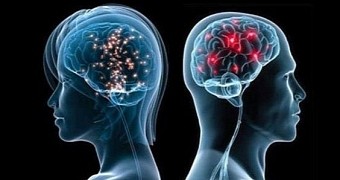Having carried out a series of experiments on mice, scientists found that the male and the female brains respond differently to foods that contain significant amounts of fat.
More precisely, it appears that the male brain is more likely to be negatively affected by a high-fat diet. Simply put, it has higher chances to show signs of inflammation as a result of exposure to unhealthy treats like pizza and fast food.
Besides, the scientists behind this research project argue that, according to evidence at hand, males are also more likely to develop heart disease if they stick to a high-fat diet for a considerable period of time.
As mentioned, the effects of high-fat foods on male health as compared to female health have until now only been documented in mice. Still, specialist Deborah Clegg and colleagues believe that their findings also hold true in the case of humans.
The mice experiments
Looking to determine how high-fat foods affect a person's overall wellbeing, the researchers fed a group of rodents hamburgers and offered them nothing but soda to drink for a considerable period of time, EurekAlert informs.
After a while, they separated the male mice from the females and closely examined the overall health condition of both these groups. Much to their surprise, they found that the high-fat diet had only taken its toll on the male rodents.
“In the study, the mice were given the equivalent of a steady diet of hamburgers and soda. The brains of the male mice became inflamed and their hearts were damaged. But the female mice showed no brain inflammation and had normal hearts during the diet,” Deborah Clegg said.
“These findings on how the brains and bodies of males and females respond so differently to nutrients suggests we have to reconsider whether the diets and drugs we recommend for managing obesity may need to be sex-specific to be more effective,” added Richard Bergman.
A possible explanation
By the looks of it, something in the chemical makeup of the brain of the female mice that these researchers experimented on was what kept the lady rodents from suffering brain inflammation or developing heart disease as a result of their diet.
Thus, when the chemistry of the brain of the male mice was altered and made to resemble the one documented in the case of the female rodents, the gentlemen mice responded better to the high-fat diet.
“When we caused the male brain to resemble the female brain in chemical composition, it was protected from the dangerous inflammatory effects a high-fat diet created in the normal male brain,” said Deborah Clegg.
“It provided more proof that the female brain inherently possesses certain chemical qualities that protects her from the dangers of a high-fat diet,” the specialist went on to comment on these findings.
The scientists now wish to investigate whether high-fat foods affect the brains of men and women differently too, and hope that their work will pave the way to the development of better treatment options for people affected by obesity.

 14 DAY TRIAL //
14 DAY TRIAL //